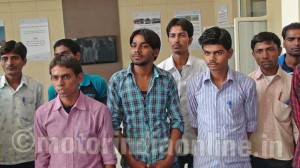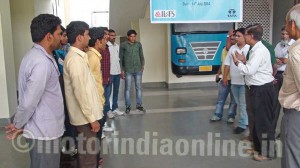By Ramesh Kumar
“What we think about a person influences how we see him. How we see him affects how we behave towards him. How we behave towards him shapes how he feels about himself.”
– Simon de Beavour
Researcher Sarada Vishbubhatala is miffed and could not control her displeasure: “Are you 100% sure that Indian truck drivers suffer from low self-esteem? I could not find even single reference to this aspect on Google. You must be joking. I think (that) it is your wild imagination that they suffer from it. Not a reality.”
Sarada’s outburst did not surprise me. Indeed, I expected her to throw a fit when I sought her assistance in researching on the low self-esteem of Indian truck drivers. At the start of the whole exercise I knew she could find nothing – repeat nothing – on this crucial issue. Why? Because why only blame motor maliks (fleet owners) who have a direct responsibility of their “wards”? Neither the transporters (non-owning class or for namesake have a miniscule fleet to enjoy the status of motor maliks since they are the serious proponents of ‘light asset’ format!) nor the consignor/consignees (owners of goods being transported at both ends: senders and receivers or sellers and buyers) were interested in the welfare of truck drivers. Another why? They felt it is none of their concerns. Transport service is what they want and least bothered about how it is executed. Pathetic attitude, indeed. Yes, every stakeholder is a culprit.
Am not talking through the proverbial hat, but out of sheer personal experience of having travelled 21,000 km in trucks across Indian highways between 2010 and 2012 and several thousand kilometres since then in surface transport vehicles for interaction with the target group (truck drivers) at transport hubs, highway dhabas and almost everywhere. Am I a vagabond or footloose, roaming on highways? No. The purpose is to figure out what is “driving” the so-called transport ecosystem when the treatment meted out to the key link viz., truck drivers is nothing short of ‘abysmal”.
That’s why on a July 2014 afternoon when Om Prakash refuses to acknowledge that he is a truck driver at New Shekhawat Shahpura Pavitra Bhojanalaya (Sikar) on the Pink City Expressway (National Highway 8) near Jaipur, I am not surprised. Returning from visiting the new IL&FS Skills Development Corporation’s Automated Driver’s Training, Testing and Skill Institute at Ajmer, we stopped over at this spacious dhaba for lunch break and that’s where I ran into the cut banian-sporting Om, partaking his lunch quietly. It’s a trucker’s dhaba and no non-trucker would like to step in. The dhaba owner Sajjan Kumar Sharma, hailing form Sikar – a district in Rajasthan packed with truck drivers’ parivar – comes to Om’s defence saying, “What are you expecting? He is not doing a Collector’s job. I’m not surprised (by his refusal) to boast of he being a truck driver. Even if you were one, you would do the same. Where’s the respect (for truck drivers)? Where is the dignity (for them)? They are treated like shit by everyone: right from his malik, RTOs on highways. Traffic police when they enter city limits.” The emotional dam has burst and reputations torn apart.
Om quietly segues into the conversation. “Life is not normal for us. Yes, am driving truck for more than 15 years, but stopped claiming that I am one for some years. Had I been educated even a little, I would have become a petrol pump attendant and there would have been more respect,” adds he with a heavy dose of hurt in his voice. His is not a lonely voice. At least a thousand kilometre away at an Indian Oil retail outlet in Ghulamipur between Kanpur and Allahabad (National Highway 2 linking Delhi with Kolkota), two truck owning motor malik Harvinder Singh from Alwar, Rajasthan echoes Om’s sentiments: “Many of us hide the fact that we are truck drivers from our own kith and kin. If this secret is out, we won’t get married because no one will give their daughters/sisters in marriage to us. Why? Because we are truck drivers.”
Walk into a highway dhaba anywhere in India and engage them in conversation. To begin with they will ignore your presence – not out of superiority complex, but out of sheer disgust for the profession they have got into. Or self-pity. Still you try to open up a conversation. They will 100% snub you. Yes, you will be treated like an outcast – from their perspective. They will watch you from the corner of their rheumy eyes while biting into the roti-shoti and sabzi, waiting to see whether you are man of steel or riverside reed. If you succeed in staying put, savouring the unpleasant welcome, then they will move in for an open debate: about their living and working conditions. One by one, they will join leading to endless cups of ‘free’ tea and tonnes of valuable input, any sociologist would love to gather. How many such studies are conducted? None or negligible. That’s why Sarada Vishnubhatala is unsuccessful in her ‘googling’ exercise.
During the conversation, their poor dressing sense and shabby appearance will not go unnoticed. Are they not making money? Yes, they do despite the fact that their payscales – if such a thing exists in their company – is nothing to crow about. Maybe Rs. 5,000-6,000/month. No social benefits such as health cover for him and his family. Invariably they make multiples of the so-called monthly pay. How? Simple: they steal diesel; they sell off spare parts; take unsafe, toll-free routes to save on fuel (more fuel saved, more money in their pocket). In spite of making approximately Rs. 25,000 every month, their dress sense is atrocious. Dirty and smelly lungis. Sleeveless banians. Unkempt hair. Unshaven chins/cheeks. Smelling of cheap liquor and equally cheap cancerous death stubs (cigarettes and bidis).
It is not an exaggeration to say that they appear ‘beggarly’. Can’t they afford to dress well? They can, but they don’t. A better dressed truck driver gets a better treatment on highways even from corrupt RTOs and traffic police. They know it, but still prefer to be uncouth and ugly. The obvious question: “For whom should I dress well? Nobody respects me.” Won’t his family be happy to see him decently dressed on his home visits occasionally? Don’t they want to emulate the Bollywood Khans: Shah Rukh, Salman and Aamir? Yes, they do. Yet, they prefer to wallow in self-pity – a big threat to their self-esteem.

Ashok Tomar, another long haul truck driver, pointedly asks at Benares on a rain-hit July afternoon: “Forget about RTOs. Traffic Police. What about our own company people? Motor maliks, by and large, are good. Our regular interaction is not with them but with other people working for him. They don’t treat us well.” He has a valid point. It’s true. There is a certain amount of positivity between motor maliks and drivers. Their ire and angst is against the middle level staff. Respect for drivers is something these middle level executives do not possess. Or not care for. Strangely, motor maliks do not demand better behaviour from this recalcitrant middle rung – particularly in their new found love viz., driver relationship management.
The transporter fraternity is crying hoarse about the looming driver shortage. India needs 5 million drivers by 2015 but as of today, the tally is not more than 3 million. A huge gap – bridging of which is going to be a herculean task as there are no takers for truck driver as a career option. Unless and until every single entity in the transport ecosystem – motor maliks, transporters, consignors, consignees and the governments at State and Central level, etc. – wake up from their deep slumber and change their attitude towards truck drivers – the backbone of any economy – the nation is heading for a head-bump. GDP will go for a toss with no vehicle to ferry raw materials to production/manufacturing facilities and none to move the finished goods to the nooks and corners of this vast country.
Still nothing is lost. What’s missing is our collective inability to accept the concept of ‘dignity of labour’. No job is low or high. All jobs are important. A depressed segment of society – remember, there are more than million drivers in India – is bad for the economic health. Our recent history shows that a lowly roadside tea seller has risen to the top office of this country. So nothing is impossible. Or should we wait for a truck driver to occupy our mental space on national level to usher in our own behavioural chance? We, as Indians believe in next birth or afterlife. Imagine or put yourself in the shoes – no, … slippers of Indian truck driver in your next life. Would we like to be treated shabbily? Think.
The writer is the author of 10,000 KM on Indian Highways, Naked Banana! and An Affair With Indian Highways. He is also the Founder Chairperson of KRK Foundation, a registered Trust focused on improving the working and living conditions of truck drivers and their families living in remote villages of India. He is reachable at ramesh@krkfoundation.org

